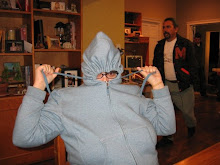I received this book from LibraryThing Early Reviewers. Please ignore the cover, which is, I think, the world's ugliest cover. I couldn't stand looking at it the whole time I was reading the book. It looks like a third grader drew it.
I believe the book is for YA audiences, but it is hard to tell, as there was some sexually suggestive content and quite a bit of gore. It covers the time that Prince Erechtheus of Attike' spends as a hostage in the kingdom of Poseidia. I wasn't really clear about WHY the various kingdoms send the hostages, but it seemed to be more like a foreign exchange program than an actual hostage situation, as the hostages were all educated and treated well, even given some measure of freedom. Erech is to stay from his 12th year through his 25th, and then he can return to his own kingdom to, hopefully, take the throne. He has many adventures as he learns and adjusts to his new home.
The book, to me, was like a cross between the Harry Potter books (kids going away to be educated and learning about powers they didn't know they had) and the Clan of the Cave Bear series (the two are not set in the same time period, per se, but some of the elements remind me of Ayla's experiences). I liked it, but it wasn't great literature. It was mostly a series of different adventures that Erech and his friends experience, but they didn't seem to be connected by any overarching theme or really connected in any way. I think I received the second in the series to review also, but I'm not sure. If not, I'm not sure I would seek it out.
Recommended for the younger set, with a warning about a couple of risqué scenes (not overly graphic, and probably not as bad as what is in most modern YA, but just in case parents are easily offended, I wanted to put that out there); recommended for those with an interest in light fantasy and/or Ancient Greek/Rome. I would imagine that those who like Rick Riordan's work might enjoy this book. I give it three out of five Whatevers.
2013-10
Sunday, September 29, 2013
Saturday, September 7, 2013
Review: Beloved by Toni Morrison
Gorgeous, gorgeous, gorgeous. Heartbreaking and spellbinding. Unforgettable. I don't know what else I have to say besides that. I understand why Toni Morrison won the Nobel Prize for Literature and why this book won the Pulitzer. I cannot believe I had not read it until now. If you haven't read it, please go out, get a copy by hook or by crook, and read it NOW.
This story of the shame of slavery and one mother's decision to make the ultimate sacrifice for her children is absolutely a must-read. What Sethe does to try to save her children the humiliation and pain she has experienced at the hands of whitepeople, and the consequences thereof, will stun you. The book hit me in the gut and then stabbed me in the heart. It's been a long time since I read a full-length novel centered around the Civil War and/or Reconstruction era, and maybe never since I read one from the perspective of a former slave. It crushed me with guilt, but Morrison's beautiful words were also a salve for that pain. I'm simply unable to adequately put into words what this book is and how it made me feel.
An unequivocal five out of five Whatevers. I got my copy from BookMooch, but it is staying on my permanent shelves. I want to read it again in a few years, and a few more after that. This book is another in my overarching quest to read the Pulitzers. I'm up to a paltry total of six, now. This one is just bewitching, much like Beloved herself. Read it. As soon as you can.
2013-9
This story of the shame of slavery and one mother's decision to make the ultimate sacrifice for her children is absolutely a must-read. What Sethe does to try to save her children the humiliation and pain she has experienced at the hands of whitepeople, and the consequences thereof, will stun you. The book hit me in the gut and then stabbed me in the heart. It's been a long time since I read a full-length novel centered around the Civil War and/or Reconstruction era, and maybe never since I read one from the perspective of a former slave. It crushed me with guilt, but Morrison's beautiful words were also a salve for that pain. I'm simply unable to adequately put into words what this book is and how it made me feel.
An unequivocal five out of five Whatevers. I got my copy from BookMooch, but it is staying on my permanent shelves. I want to read it again in a few years, and a few more after that. This book is another in my overarching quest to read the Pulitzers. I'm up to a paltry total of six, now. This one is just bewitching, much like Beloved herself. Read it. As soon as you can.
2013-9
Sunday, September 1, 2013
Review: The Hostage Bride by Jane Feather
 I finished this book last night, while watching my Dawgs get beat by Clemson. The copy I read was a Kindle book which I purchased with my own money. I bought it because my mother-in-law had given me the third in the Bride Trilogy by Jane Feather in a load of books she was getting rid of several years ago. Not being one to let good books go to another home, I snagged a whole shopping bag full of them. And, of course, I can't read the third in a trilogy without starting at the beginning! I didn't know the genre when I bought the book from Amazon, but I kind of figured it was a romance novel. I am not a HUGE romance reader, but I do like a good, dirty novel every once in a while.
I finished this book last night, while watching my Dawgs get beat by Clemson. The copy I read was a Kindle book which I purchased with my own money. I bought it because my mother-in-law had given me the third in the Bride Trilogy by Jane Feather in a load of books she was getting rid of several years ago. Not being one to let good books go to another home, I snagged a whole shopping bag full of them. And, of course, I can't read the third in a trilogy without starting at the beginning! I didn't know the genre when I bought the book from Amazon, but I kind of figured it was a romance novel. I am not a HUGE romance reader, but I do like a good, dirty novel every once in a while.The book is about Portia Worth, bastard daughter of ne'er-do-well Jack Worth, unacknowledged son of the House of Granville. The Granvilles have been feuding with the House of Decatur for years, ever since Cato Granville and Rufus Decatur were young boys, and Cato saw his father take his own life, rather than submit to the Decaturs. When Jack dies, his last request is that Cato make sure his daughter has a place in Castle Granville. Portia is a rough and tumble girl, a tomboy, not accustomed to civilized society, whose only wish is to be a soldier someday. During a botched kidnapping attempt, Decatur thugs grab Portia, instead of her cousin Olivia, and she becomes a hostage of the House of Decatur. And then, of course, she falls in love with her captor. And there is sex. Will she return to the Granvilles or stay with the House of Decatur? Will her family ever forgive her?
I did like the book, and I'm giving it three out of five Whatevers. It's not high literature, but it was a quick read and a nice bit of fluff in between more substantial reads. There were many typos which annoyed me (seriously, an apostrophe every now and then would not kill you), and I was a little squicked by not only the Stockholm Syndrome-ness of it all, but also by the next-door-to-abusive behavior of the brutish Rufus Decatur. But overall, I liked Portia and her ability to go against the social mores of the 17th century. The development of the friendship between the girls seemed a bit fast and inorganic, but I'm able to suspend my disbelief quite a bit in order to get through a book. Recommended for romance-lovers, but not recommended for feminists or those who are easily offended by sex scenes.
2013-8
Subscribe to:
Comments (Atom)





